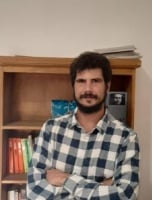Biography
Diego Cabrol is a lecturer at the Faculty of Agronomy of the National University of Córdoba (Argentina). His PhD thesis analyzed the access and appropriation of rural water in Western Córdoba (Argentina) and the conflicts that emerged from this dispute. Now his Postdoctoral project proposes to analyze the factors that determine the conditions of access of different social actors to Nature’s Contributions to People. He has been participating in different research projects with the Nucleo-DiverSus Research Team (https://nucleodiversus.org/). He has an important fieldwork experience with different rural actors (e.g., peasants, agricultural farmers, cattle ranchers and several environmental and socio-productive organizations).
Abstract
Changes in the patterns of use and appropriation of hydric resources in Western Córdoba, Argentina
Drawing upon a case study in central Argentina, the research puts forward a conceptual framework aiming at understanding how social actors access and appropriate rural water, and which are their main appropriation strategies. The study area is located in an arid region where the productive changes that occurred during the last three decades had consequences on the way in which peasants, capitalized farmers and capitalized cattle ranchers, access to water sources. To analyze these changes, I distinguish four types of water according to the uses and destinations that were assigned by users (i.e., blue water for livestock and irrigated crops, blue water for domestic use, green water contained in fodder, and forest green water).
I observe that economical, ecological, social and productive changes, affect the conditions to water access for the different stakeholders, for all water types. Within this framework, I propose to highlight the importance of (i) analyzing whether a dispossession process is occurring (and how),
(ii) identifying the main factors that are reshaping stakeholders’ strategies and which are the main outputs in terms of conflicts and symbolic and material power relationships, and (iii) understanding the foundations upon which water access and appropriation rest.
The main research findings help to understand how the expansion of agrarian capitalism undermines the autonomy of peasants and the rural poor to access water for productive ends, and compromises their livelihood strategies. This reinforces their subordinated position in heterogenous territories where capitalist relations are expanding, and expose structural inequalities that increase their vulnerability.
Affiliation: National University of Córdoba, Argentina

